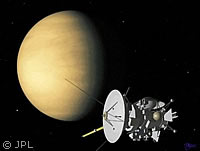Commission plans to make space a horizontal priority with publication of White Paper
The European Commission has put forward proposals for a European space policy, to be implemented by a multi-annual programme that will allocate increased funding as demand arises. The Commission's white paper - 'Space: a new European frontier for an expanding Union. An action plan for implementing the European Space Policy' - was drawn up by the Commission, in collaboration with the European Space Agency (ESA), following a six month consultation period on the preceding green paper. It outlines how space technologies can help the EU achieve its main objectives: faster economic growth; job creation and industrial competitiveness; enlargement and cohesion; sustainable development; and security and defence. 'The final result shows that policy makers and citizens alike strongly support a more active role for the EU in space,' said EU Research Commissioner Philippe Busquin. 'This white paper is a call for action to mobilise Europe towards new goals and to meet new challenges. It will help us move ahead and put Europe's scientific talents, technologies and entrepreneurial skills to work for Europe and its citizens.' The backbone of the paper is the Commission's proposal to establish the European space policy as a horizontal policy. Institutional arrangements are not detailed in the white paper as the Commission must first wait to see whether space is made a shared competence in the European Constitution, as expected. Under the multi-annual programme, a much higher budget would be available than is currently the case. '[T]he actual and potential benefits of space technologies cannot be fully secured under present institutional and budgetary arrangements,' states the white paper. 'These are mainly focused on research and development, and are not appropriate for an optimal exploitation of space assets.' It is not clear from where the additional funding would come, although the paper states that 'A number of scenarios for raising Union spending on space can be envisaged.' The volume of resources is likely to be dependent upon 'the ambitions of the Member States and the capacity of the Union's 'space system' to react and absorb them.' Increased public investment is expected to have a significant leverage effect on mobilising resources from other EU actors. Institutional responsibilities, the subject of ongoing negotiations between the Commission and ESA which are intended to result in a framework agreement, are addressed in the proposal. The Commission envisages extending its sphere of competence, enabling it to drive, fund and coordinate activities within a new space policy. For its part, ESA would take the lead in elaborating, proposing and developing the required solutions. National space agencies and research organisations would be largely responsible for implementing the programme's lines of action relevant to them. The white paper also recommends action to ensure Europe's independent access to space, enhance space technology, promote space exploration, attract more young people to careers in science, and to strengthen European excellence in space science. The paper is described as a 'call to action' by the Commission, which prophesises grave consequences for Europe's space industry if the proposal is not accepted by all actors and stakeholders: 'If Europe does not adopt the proposed approach to space policy, it will decline as a 'space power' because of an inability to develop new technologies and sustain applications,' warns the white paper



